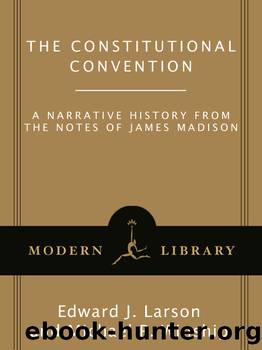The Constitutional Convention by James Madison

Author:James Madison [Larson, Edward J.]
Language: eng
Format: epub
ISBN: 978-0-307-78920-4
Publisher: Random House Publishing Group
Published: 2011-04-05T16:00:00+00:00
—
Mr. G. MORRIS moved to strike out the last member of the section beginning with the words “qualifications of electors” in order that some other provision might be substituted which would restrain the right of suffrage to freeholders.
Mr. FITZSIMONS seconded the motion.
…
Mr. WILSON. This part of the report was well considered by the committee, and he did not think it could be changed for the better. It was difficult to form any uniform rule of qualifications for all the states. Unnecessary innovations, he thought too, should be avoided. It would be very hard and disagreeable for the same persons at the same time to vote for representatives in the state legislature and to be excluded from a vote for those in the national legislature.
Mr. G. MORRIS. Such a hardship would be neither great nor novel. The people are accustomed to it and not dissatisfied with it in several of the states. In some, the qualifications are different for the choice of the governor and representatives, in others, for different houses of the legislature. Another objection against the clause as it stands is that it makes the qualifications of the national legislature depend on the will of the states, which he thought not proper.
Mr. ELLSWORTH thought the qualifications of the electors stood on the most proper footing. The right of suffrage was a tender point and strongly guarded by most of the state constitutions. The people will not readily subscribe to the national constitution if it should subject them to be disfranchised. The states are the best judges of the circumstances and temper of their own people.
Col. MASON. The force of habit is certainly not attended to by those gentlemen who wish for innovations on this point. Eight or nine states have extended the right of suffrage beyond the freeholders. What will the people there say if they should be disfranchised? A power to alter the qualifications would be a dangerous power in the hands of the legislature.
Mr. BUTLER. There is no right of which the people are more jealous than that of suffrage.…
Mr. DICKINSON had a very different idea of the tendency of vesting the right of suffrage in the freeholders of the country. He considered them as the best guardians of liberty and the restriction of the right to them as a necessary defense against the dangerous influence of those multitudes without property and without principle, with which our country, like all others, will in time abound. As to the unpopularity of the innovation, it was, in his opinion, chimerical. The great mass of our citizens is composed at this time of freeholders and will be pleased with it.
Mr. ELLSWORTH. How shall the freehold be defined? Ought not every man who pays a tax vote for the representative who is to levy and dispose of his money? Shall the wealthy merchants and manufacturers, who will bear a full share of the public burdens, be not allowed a voice in the imposition of them? Taxation and representation ought to go together.
Download
This site does not store any files on its server. We only index and link to content provided by other sites. Please contact the content providers to delete copyright contents if any and email us, we'll remove relevant links or contents immediately.
The Secret History by Donna Tartt(16621)
The Social Justice Warrior Handbook by Lisa De Pasquale(11489)
Thirteen Reasons Why by Jay Asher(7788)
This Is How You Lose Her by Junot Diaz(5769)
Weapons of Math Destruction by Cathy O'Neil(5036)
Zero to One by Peter Thiel(4824)
The Myth of the Strong Leader by Archie Brown(4789)
Promise Me, Dad by Joe Biden(4447)
Beartown by Fredrik Backman(4415)
Stone's Rules by Roger Stone(4415)
How Democracies Die by Steven Levitsky & Daniel Ziblatt(4398)
The Fire Next Time by James Baldwin(4342)
100 Deadly Skills by Clint Emerson(4076)
A Higher Loyalty: Truth, Lies, and Leadership by James Comey(4032)
Rise and Kill First by Ronen Bergman(4012)
The David Icke Guide to the Global Conspiracy (and how to end it) by David Icke(3881)
The Farm by Tom Rob Smith(3872)
Secrecy World by Jake Bernstein(3782)
The Doomsday Machine by Daniel Ellsberg(3730)
